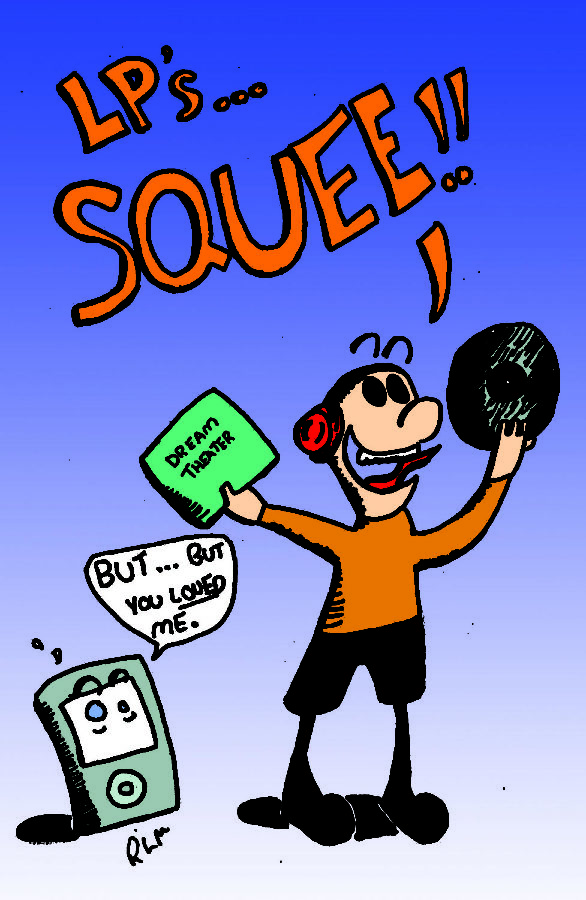OPOIEN: Convenience over quality?
September 16, 2008
Last Tuesday, Apple unveiled a revamped line of iPods. No major changes were made from the current models, aside from a few storage capacity adjustments. The most notable difference was that the newest iPod Nano had been redesigned to resemble the second-generation Nano, abandoning the short, square third-generation’s design. While incorporating new technology, the Nano’s appearance is taking a step back in time to a more popular model. The redesign of the iPod Nano isn’t the only example of regression in the field of music technology. In the age of digital music, more and more artists are straying from the MP3 standard and releasing albums in vinyl format. Vinyl LP records are no longer popular only with DJs and audiophiles, they are making their way back into the mainstream market. Does Apple have it right? Should we be looking to the past when it comes to music?
As I write this column I’m listening to several classic vinyl albums. These are all albums that I’m used to hearing in digital format, either on my iPod or streaming through my MacBook Pro speakers. Our generation has grown accustomed to digital music, with CDs and, most recently, with iPods and MP3 players. We often forget — or aren’t aware of — the difference in quality between original vinyl recordings and digitized versions. Growing up with cassette tapes, CDs and MP3s, my musical perspective changed the day I set up a turntable and listened to my parents’ old records. The moment the needle touched the vinyl, the warm crackle made it clear that good things were about to come from the speakers. It’s difficult to describe the vinyl sound to someone who hasn’t experienced it, but the general consensus of vinyl lovers is that it’s a warmer, richer sound. Vinyl creates a more intimate experience, during which the listener feels more connected to the music, as if he or she is in the studio with the musicians.
When a music recording is converted to CD format, the data file is compressed, which results in a slight loss of quality. The file is further compressed when it is transferred to a computer, and even an audio file with a high bit rate loses a significant amount of sonic data in the effort to become as compact as possible. Many details from the original recording disappear in the compression process. As part of a sad, emerging trend, many recent recordings designed specifically for digital formats have fewer details and nuances to begin with. Knowing that an album most likely will be played through computer speakers, mastering engineers often adjust the sound levels to make every aspect of the track louder than normal. This technique, which eliminates the difference between the loudest and softest parts of the song, is called dynamic range compression. The idea behind this practice is that because MP3 compression tends to eliminate sonic data at the highest and lowest ends of the spectrum, music should be recorded pre-compressed in order to prevent further loss in the conversion process. For some artists, compression isn’t a problem, and some listeners don’t notice a difference in sound quality. However, there is no match for the sound of music in its original, uncompressed format, and this pristine audio quality can be found with vinyl.
According to Nielsen SoundScan, nearly 1 million LPs were purchased in 2007, up from 858,000 in 2006. In comparison, according to the Recording Industry Association of America, CD shipments decreased 17.5 percent during the same period of time. The decline in CD sales is more directly related to the 38 percent increase in digital song downloads from 2006-2007, however vinyl is clearly making a comeback. According to RollingStone Magazine, the Raconteurs recommended hearing their latest album on vinyl, and an increasing number of artists are releasing new albums and re-mastered classics in LP form. When Elvis Costello and the Imposters released Momofuku in April, the vinyl version came out several weeks before the album was released on CD. As an added bonus, the LP included a coupon for a free digital download of the album.
Because of the costs associated with manufacturing plastic vinyl, the medium probably won’t ever enjoy the mainstream success it did when it was the only option on the market. There are few pressing plants left, and the manufacturing process requires oil and shipment by truck — not easy with today’s fuel prices. However, for excellent sound quality, there are cases in which it is well worth paying a few extra dollars for an LP, rather than an MP3. Classic albums, such as Pink Floyd’s “Dark Side of the Moon” and Led Zeppelin’s “Led Zeppelin II,” were made to be played on a turntable. Listening to Pink Floyd’s “Money,” the sounds of coins jingling and cash registers ringing are much clearer on vinyl. Jimmy Page’s guitar playing is noticeably warmer on the “Led Zeppelin II” LP, and John Paul Jones’s bass stands out much more than it does in MP3 format. Some new albums, such as My Morning Jacket’s “Evil Urges,” are even mastered so that the vinyl LP versions contain additional octaves and smoother frequencies. For the true music fan, there is nothing more rewarding than listening to a favorite album on vinyl.
— Jessica Opoien is a freshman in English from Marinette, Wis.

















